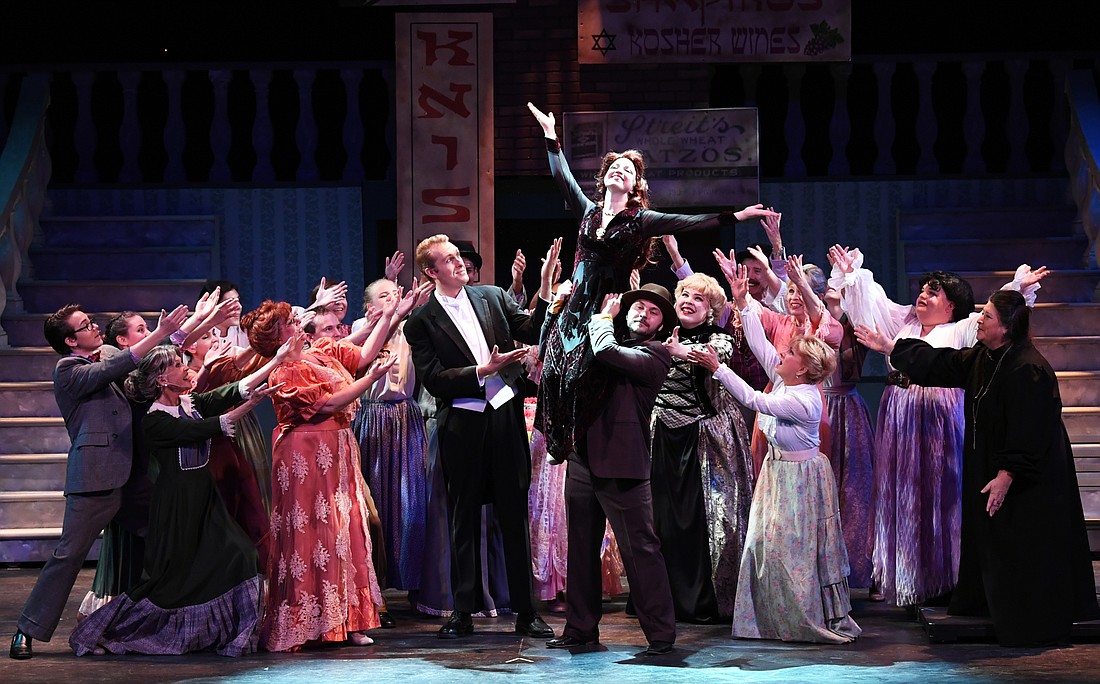- November 23, 2024
-
-
Loading

Loading

“Funny Girl” is a big, big musical. This massive show (now playing at The Players Centre for Performing Arts) makes a big deal out of two small stories: The story of a woman who defies the odds and breaks into show business and a story of the same woman, who finds love, then loses it.
Fanny Brice (Vera Samuels) is the woman’s name. She was a comedienne, and one of America’s top stars in the 1920s and ’30s. Brice made it big and broke all the rules for female celebrities. She was unabashedly Jewish and never tried to hide her origins. Her Rubenesque physique exceeded the Jazz Age’s skinny standard for feminine beauty. Instead of wearing corsets, she made a running joke out of her size.
Brice wasn’t ladylike, polite or classy. But she was funny as hell. That was enough to make her a star and make her rich.
“Funny Girl” is a love letter to Brice. She’s the musical’s central character — in the sense that a saint is the central character of a medieval icon.
Brice is larger-than-life; lesser folk surround her like tiny satellites. They’re funny and well drawn. But they’re stock types designed to reflect the glory of St. Brice.
Director Helen Holliday swims against the tide of the material. She tries to find honest revelations of other characters besides Fanny Brice. She occasionally succeeds, when there’s material to work with. But the bulk of the musical revolves around Brice. Holliday honors that intent. She keeps her focus on Brice’s story and turns it into a tale of female empowerment.
Samuels is outstanding as Brice. It’s a sweet characterization without a hint of second-hand Streisand. Her bashful and bold comic reactions remind me of Ellie Kemper’s persona in “Unbreakable Kimmy Schmidt.” (Samuel’s sweetness also fills me with cognitive dissonance. She was terrifying in the lead role of “Venus in Fur” at Venice Theatre. I suppose that just shows her range.)
Samuels is particularly funny in the “His Love Makes Me Beautiful” number, where she sabotages Flo Ziegfeld’s sentimentality with a cheeky gag.
The huge ensemble delivers strong characterizations of the supporting characters. Standout performances include Christopher Kehoe’s as Brice’s sharp-dressed, sharp-dealing husband, Nicky Arnstein (lucky in love, unlucky at gambling); Patrick Tancey’s Eddie, Brice’s pal and dance coach who carries a torch for the comedian; and Andrea Keddell as Rose, Brice’s wisecracking mother. Keddell’s portrayal shows you just where America’s favorite “Funny Girl” got her spunk.
The technical and creative elements all come together. Brian Finnerty’s choreography never disappoints. Under Michelle Neal’s musical direction, the brassy orchestra plays the musical’s classic songs with verve. Michael Newton-Brown’s clever sets are mostly on wheels — a movable assortment of stairs and columns that can turn into anything. Tim Beltley’s costumes smartly evoke the era, without making the actors seem like overdressed mannequins.
It’s a lot of talented people. The gestalt they create is still a one-sided portrait of St. Brice. The musical’s creators (composer Jule Styne, lyricist Bob Merrill and playwright Isobel Lennart) clearly wanted it that way. Their musical feels like vicarious wish-fulfillment.
To that end, they simplified details of Brice’s life. That was partly to make a neat plot arc, but also to make her love story more palatable. Arnstein was evidently an even bigger heel in real life; he’d served a 14-month term in Leavenworth for wiretapping before he’d even met Brice.
Bottom line?
Despite its flaws, “Funny Girl” is still the next best thing to the Ziegfeld Follies. It’s a fantasy, not a realistic biography, after all. And Samuels delivers a star performance as Brice.
So forget the facts and minor characters. Above all, forget the Barbra Streisand movie and accept a different approach at The Players.
You’re sure to have a great time.